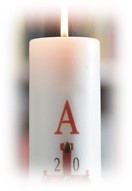At each of the Cathedral Masses on Easter Sunday more than 100 Alleluias (Praise the Lord) were sung and said!!!
It is good to have a day to be at home on Easter Monday. Our Holy Week and then Easter Sunday seem to take a lot of energy: physical, emotional, and spiritual. Our Easter ceremonies at the Cathedral were spectacular and very prayerful. The full initiation of two adults at the Easter Vigil added to its joy and meaning. At every service there were large numbers of people of all ages in attendance, from babes in arms to people on walking frames. How lovely that Easter still holds meaning for many, who may not regularly attend Mass.
Much of this is about new life, new beginnings and about faith, hope and love. This is what Easter stands for and I am glad to have been brought up in a faith-filled Christian Catholic family which provided me with a meaningful life and a reason to serve.
I imagine that few of you would have heard the seven readings from the Hebrew Scriptures as part of the Vigil Mass and I thought that in this message I would share with you one element of each of these readings. These readings are each accompanied by a psalm and prayer. They provide us with a way of hearing about God’s revealing love to the people who claim him as their own.
The readings were introduced with the following prayers:
Dear brothers and sisters, now that we have begun our solemn Vigil, let us listen with quiet hearts to the Word of God. Let us meditate on how God in times past saved his people and in these, last days, has sent his Son as our Redeemer. Let us pray that our God may complete this paschal work of salvation by the fullness of redemption.
- First Reading (Genesis 1:1 – 2:2)
God saw all that he had made, and indeed it was good. - Second Reading (Genesis 22:1-18}

…I will shower blessings on you, I will make your descendants as many as the stars of heaven and the grains of sands on the seashore. - Third Reading (Exodus 14: 15 – 15:1)
Israel witnessed the great act that the Lord had performed against the Egyptians, and the people venerated the Lord; they put their faith in the Lord and in Moses, his servant. - Fourth Reading (Isaiah 54:5 – 14)
….for the mountains may depart, the hills be shaken, but my love for you will never leave you and my covenant of peace with you will never be shaken, says the Lord who takes pity on you. - Fifth Reading (Isaiah 55:1 – 11)
Seek the Lord while he is still to be found, call to him while he is still near. Let the wicked man abandon his way, the evil man his thoughts. Let him turn his back to the Lord who will take pity on him, to our God who is rich and forgiving; for my thoughts are not your thoughts, my ways not your ways – it is the Lord who speaks. - Sixth Reading (Baruch 3:9 -15, 32 – 44)
Walk in the way of God and you will live in peace forever. - Seventh Reading (Ezekiel 36: 16 – 28)
I shall give you a new heart and put a new spirit in you; I shall remove the heart of stone from your bodies and give you a heart of flesh instead.
It was good to be able to sing the psalms, the Gloria and Alleluia after the sombreness of Lent. I hope some of the scripture quotes above continue to give us guidance as the universal church prepares for the second session of the Synod on Synodality.
Over the coming weeks, I will be preparing our diocesan feedback to the Synthesis Report on how we can be a synodal church in mission, having received twelve responses from diverse groups in the diocese. The question which groups have responded to is:
How can we enhance the differentiated co-responsibility in the mission of all the members of the People of God?
There were two sub-questions to assist with these spiritual conversations:
- What ways of relating, structures, processes of discernment and decision-making with regard to
- mission make it possible to recognise, shape, and promote co-responsibility?
- What ministries and participatory bodies can be renewed or introduced to better express this co
-responsibility?
Those of us who participated in these conversations, found the experience to be
found the experience to be
profound as we listened deeply to each other and the Spirit.
Our final diocesan report for this process will be made public.
Over this Easter Season, please pray for our minds and hearts to be enlightened.
Easter blessings to each of you.
Follow mnnews.today on Facebook.

